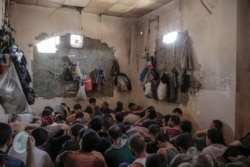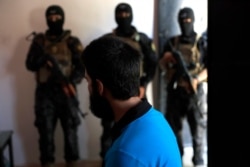Last update: Aug. 7 at 11:00 a.m.
Parts of Syria freed from the clutches of Islamic State are starting to hold some members of the terror group accountable for their crimes, with the backing of the United States.
While most of the world's attention has been focused on the approximately 2,000 foreign IS fighters currently in the custody of the U.S.-backed Syrian Democratic Forces (SDF), another 8,000 suspected IS fighters from Syria and Iraq are also behind bars.
U.S. officials estimate about half of those 8,000 prisoners are from Syria. And now, it seems, at least some of them are being brought to justice.
"The SDF continues to work with local community leaders and local judicial processes to help address issues of ISIS accountability," a State Department official told VOA, using another acronym for the terror organization.
That accountability includes "sentencing fighters who are proven to have committed crimes," the official added.
There are few details about how justice is being carried out and what safeguards, if any, have been put in place to ensure accused fighters get a fair hearing.
U.S. officials have not been willing to say how many cases have been settled by Syrian communities in areas liberated by the SDF, a non-state actor made up of mostly Kurdish fighters.
Officials with the SDF and the group's political wing have so far declined to respond to requests for comment.
Until now, they have alternatively called for international help with the prisoners and threatened to release them if help does not come, pointing out that all 10,000 of the alleged IS fighters are being kept in a series of makeshift prisons that cannot hold them for the long term.
"We have efforts in place," Ambassador James Jeffrey, U.S. special representative for Syria, told reporters at the State Department last week.
"They're going slowly — to move — but they're going to move the Iraqis back to Iraq, and the Syrians to be placed on trial," he added.
Some human rights and aid groups contacted by VOA said while they have heard talk about the possibility of real trials for alleged Syrian IS fighters, they had yet to see firm indications any sort of internationally recognized judicial proceedings are getting underway.
And some of the steps taken by local authorities in northeast Syria, including setting up so-called People’s Protection Courts, have incurred criticism from groups like Human Rights Watch.
Makeshift Syrian courts
“Although the death penalty is prohibited, the proceedings remain deeply flawed,” Lama Fakih, Human Rights Watch deputy director for Middle East and North Africa, told VOA in an email.
Fakih described the People’s Protection Courts as “part of a nascent judicial system” that has not been recognized by the international community, the Syrian government or even most of the countries in the coalition that has been supporting the SDF.
Still, she said the courts have tried hundreds of alleged IS members.
“There are no defense lawyers to represent suspects and no appeals process,” Fakih said, adding the lack of international recognition is “raising doubts about the long-term impact and enforceability of the rulings to date.”
HRW has also raised concerns about the conditions for the families of suspected IS fighters in SDF custody.
In a report released last month, HRW wrote the more than 11,000 women and children in camps like al-Hol in the Kurdish Autonomous area in northeast Syria were being held "in appalling and sometimes deadly conditions."
Trying IS fighters in Iraq
Even in Iraq, where there is an internationally recognized government and judicial system, the trials of hundreds of accused IS fighters and collaborators has raised alarm.
A new report by the U.S. Defense Department's inspector general, released Tuesday, cited "significant due process concerns" by U.S. diplomatic officials about the way cases have been proceeding, noting the problems resulted in trials "characterized by some U.N. agencies and NGOs as arbitrary and unfair."
And Human Rights Watch, in a report published this past March, said some trials “lasted as short as 5 minutes… usually relying on a confession, often coerced, with no effective legal representation.”
Foreign fighters' fate
As for IS foreign fighters and their families, the United States has been urging their countries of origin to take them back and prosecute them.
"These fighters are dangerous, battle-hardened terrorists," Ambassador Nathan Sales, State Department counterterrorism coordinator, said last Thursday. "No one should expect the United States to solve this problem for them, or the SDF, or anyone else."






